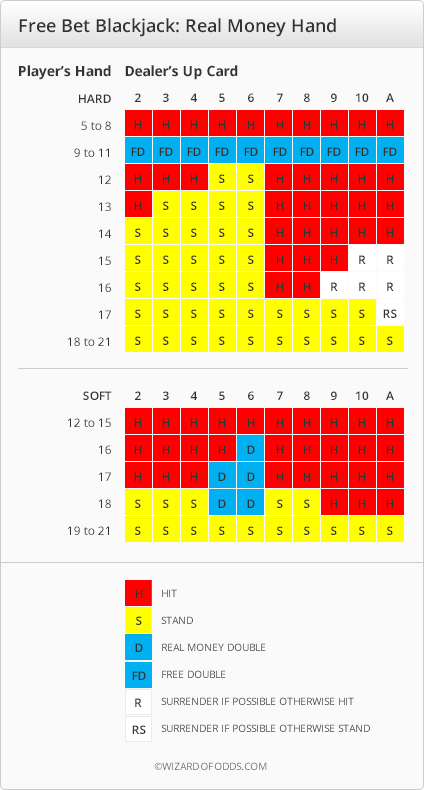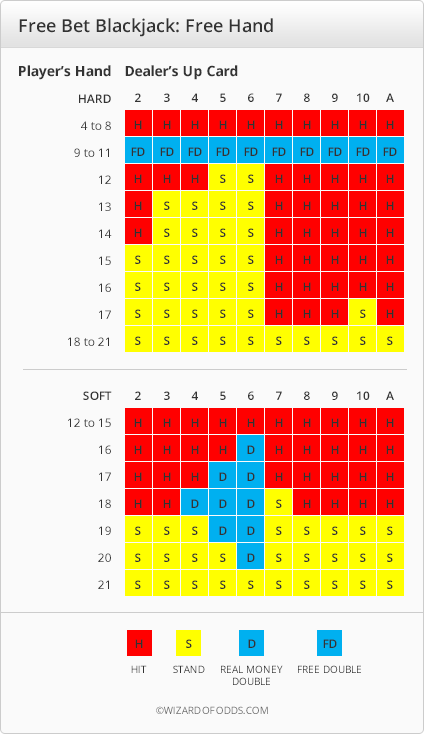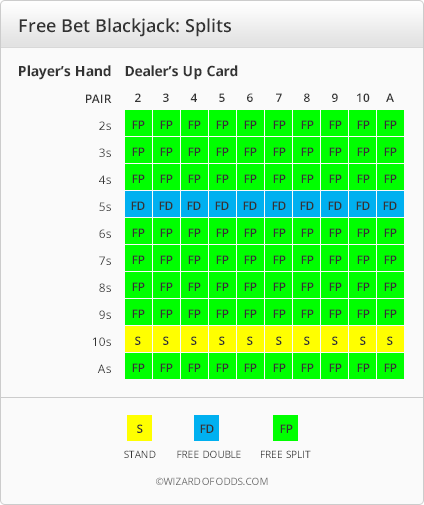On this page
Free Bet Blackjack
On this page
Introduction
Free Bet Blackjack is a blackjack variant by game inventor Geoff Hall. The twist to this one is the player doesn't have to risk his own money when splitting or doubling (most of the time). It is like playing with a generous boyfriend at the table who makes all the supplemental bets for you and lets you keep the winnings. What is the catch? Like in Geoff's other game, Blackjack Switch, if the dealer gets a 22, all bets left standing push.
The game opened for business on June 20, 2012 at the Golden Nugget. I went down for the game's debut and found the table full of people enjoying the game. The strategy is simpler and offers more doubles and splits than conventional blackjack. Gamblers who find the basic strategy of conventional blackjack too complicated to memorize may take relief in the simplicity of Free Bet Blackjack.
 Ohio Recommended Online Casinos
View All
Ohio Recommended Online Casinos
View All
Rules
The rules have changed since the game launched at the Golden Nugget. It is my understand that the rules below are now the norm. The game is based on standard blackjack, with the following rules:- Six decks
- Dealer hits soft 17's
- Blackjacks pay 3 to 2
- Double after split allowed
- Double on two cards only
- Re-split pairs up to four hands, including aces
- No surrender
The game introduces two major rule changes:
- "Free Doubles" on hard totals of two-card total of 9, 10, or 11. Regular doubles are still allowed on all other two-card hands. With a "free double," the player's original wager is matched with a "free bet" button and the player receives one additional card. At the end of the hand:
- If the dealer wins, the player loses his original wager only.
- If the hand results in a push, the player gets back his original wager only.
- Otherwise, if the player wins, the player gets back his original wager plus winnings equal to double that wager.
- "Free Splits" on all pairs except 10's. With a "free split," the player's two cards are divided into two one-card hands. The player's original wager is placed with the first hand and a "free bet" button is placed with the second hand. The player plays out each hand one at a time and is entitled to a "free double" or "free split" on both hands. For winning hands, each "free bet" button is replaced with real chips equaling the original wager. On hands resulting in a player loss or push, the dealer takes back the "free bet" button.
- Dealer pushes on 22. If the player has 21 or less and the dealer busts with 22, then the player's wager is a push.
Online Blackjack Casino Bonuses View All
Bonus Code
Same for Video Poker, Blackjack
- 40 times on Slots, Dragon Tiger
Bonus Code
Same for Blackjack, Video Poker
- 40 times on Parlor Games, Slots, Dragon Tiger
Bonus Code
Same for Blackjack, Video Poker
- 40 times on Parlor Games, Slots, Poker
Basic Strategy
Strategy depends on whether you are playing a real money bet or a free bet. There is a difference because a push is just as bad as a loss on a Free Bet, thus causing a more aggressive strategy. The following three tables show the strategy for a real money hand, free bet hand, and pairs respectively.



If you remember just one thing about the strategy, accept every free double and free split opportunity.
House Edge
The house edge under the standard rules above is 1.04%.
Rule Variants
Following are the effects of some possible rule variants. The effects are the change in the player's expected return. The figures below with a (SH) were taken with permission from Discount Gambling. The ones with a (Wiz) were calculated by me. It is interesting that the greater the number of decks, the better the odds for the player, which is the opposite of conventional blackjack. I assume it is because there is more free-splitting with more decks, due to a lesser effect of non-replacement.
- Free doubles with three or more cards (DG): +0.66%.
- Dealer stands on soft 17 (DG): +0.31%.
- Late surrender allowed (DG): +0.21%.
- One deck: -0.14% (Wiz).
- Two decks: -0.06% (Wiz).
- Eight decks: +0.01% (Wiz,DG).
- No re-splitting aces (DG): -0.08%.
- No free re-splits on a pair of fours (DG): -0.27%.
- No re-splitting 2-9: -0.32% (DG).
- No double or free-double after a split (DG): -0.70%.
- Blackjack pays 6 to 5: -1.36% (Wiz).
Pot of Gold
I have heard reports that some casinos offer a side bet called Pot of Gold, which is based on the number of Free Bet tokens the player accumulates per initial hand. The Washington Gambling Commission lists two Pot of Gold pay tables. Following is my analysis of both of them. These tables were based on a random simulation. The lower right cells show a house edge of 5.77% on pay table 1 and 4.64% on pay table 2.
Pot of Gold — Pay Table 1
| Tokens | Pays | Probability | Return |
|---|---|---|---|
| 7 | 1000 | 0.000002 | 0.002026 |
| 6 | 300 | 0.000027 | 0.008140 |
| 5 | 100 | 0.000194 | 0.019445 |
| 4 | 60 | 0.000847 | 0.050799 |
| 3 | 30 | 0.003866 | 0.115973 |
| 2 | 10 | 0.013488 | 0.134884 |
| 1 | 3 | 0.148155 | 0.444466 |
| 0 | -1 | 0.833420 | -0.833420 |
| Total | 1.000000 | -0.057686 |
Pot of Gold — Pay Table 2
| Tokens | Pays | Probability | Return |
|---|---|---|---|
| 7 | 100 | 0.000002 | 0.000203 |
| 6 | 100 | 0.000027 | 0.002713 |
| 5 | 100 | 0.000194 | 0.019445 |
| 4 | 50 | 0.000847 | 0.042333 |
| 3 | 30 | 0.003866 | 0.115973 |
| 2 | 12 | 0.013488 | 0.161861 |
| 1 | 3 | 0.148155 | 0.444466 |
| 0 | -1 | 0.833420 | -0.833420 |
| Total | 1.000000 | -0.046426 |
The player can lower the house edge on the Pot of Gold by splitting fives instead of doubling, at the detriment of the primary wager. If the player splits fives the house edge on the Pot of Gold will be 2.75% under Pay Table 1 and 1.48% under Pay Table 2. Splitting fives, instead of doubling, will increase the house edge on the base wager by 0.15%.
Push 22 Side Bet
Blackjack Switch often offers a side bet that pays 11 to 1 if the dealer draws to 22 points. If the game uses six decks and the dealer hits on soft 17, then the probability the dealer draws to 22 is 0.073536 and the expected value is -0.117565. For more information, please see my page on the Push 22 side bet.
Acknowledgement
I would like to thank Geoff Hall, the inventor, for his cooperation with the rules and sharing the math report. This report is based on a combination of work between Stephen How and me. We are in close agreement on the house edge. The basic strategy and some of the effects of rule variations are the work of Stephen How.
Best Online Blackjack Odds in 2024 View All
A list of blackjack games found online by major software providers of Internet casinos with the house edge of each.
| House Edge | Game review | Play | Decks | Soft 17 | Double After Split | Peek | Surrender |
|---|---|---|---|---|---|---|---|
| 0% | Concept Gaming(Jackpot Blackjack) | Super Slots | 6 | Stand | No | No | Yes |
| 0.01% | Concept Gaming(7 Handed European Blackjack) | Super Slots | 6 | Stand | No | No | No |
| 0.11% | Ezugi(Blackjack) | Casino Adrenaline | 8 | Stand | Yes | Yes | Yes |
| 0.14% | Playtech(Blackjack Switch) | EmuCasino | 6 | Hit | Yes | No | No |
Internal Links
- Original rule card. Please note that doubling on three or more cards is no longer allowed but free splits of fours is. Overall, the old rules were better, of course. Table game rules seldom get better for the player.
Outside Links
- Free Bet Blackjack page at Discount Gambling.
- Free Bet Blackjack Facebook page.








